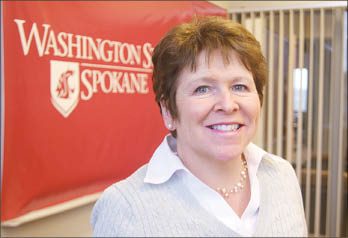Lisa Brown relishes new role at WSU Spokane
Former state senator says downtown could benefit as WSU Spokane grows

Former Washington state senator and new Washington State University Spokane chancellor Lisa Brown says she intends to continue pushing the campus forward on its current trajectory: carving out a biomedical campus that can stimulate the downtown economy.
The continued development of the U District and the WSU Spokane campus will create that beneficial effect, with businesses in the city's core likely to see more student and faculty traffic as the medical program and campus develop Brown predicts.
"The whole downtown is going to be affected as the campus grows," Brown says.
She says the 3rd Legislative District she used to serve, which is where WSU Spokane is located, consistently has had one of the lowest average incomes among all the state's districts.
"This campus is going to change that if anything will," she adds.
Brown, 56, stepped into the role of chancellor on Jan. 3 after serving as a state senator for 16 years.
"When I stepped down from the Legislature, I didn't know this position would be there," she says.
Brown says WSU President Elson Floyd contacted her about the open position, agreeing to wait until after the election to talk about it seriously.
She took over for previous WSU Spokane Chancellor Brian Pitcher, who had held the position since 2005. She says Pitcher is currently acting in an advisory role, and further details about his future role at the university will be released at a later date.
Brown says she feels she stepped into a place where ideas and goals for the WSU Spokane campus had already been put in motion. She adds that she sees her role as continuing the campus on its current trajectory and to carry out those goals.
"Having a four-year medical program is part of that," Brown says.
The WSU Spokane Biomedical and Health Sciences Building, which is tentatively slated to be completed this November, will be a 125,000-square-foot facility that will include research and teaching labs, classrooms, and offices for health sciences. The building will house the medical education program and the WSU College of Pharmacy, which currently is split between the Spokane and Pullman campuses, says Doug Nadvornick, health sciences communications coordinator.
Brown says she took the position because knew she still wanted to work in public policy, and the chancellor role enables her to combine her legislative and higher education backgrounds.
"It seems a natural outgrowth for the things I worked for in the Legislature," Brown says.
Brown had been a part of the Legislature for 20 years, counting her years as a state representative. The 3rd Legislative District that she has represented includes much of Spokane and is bordered by Francis Avenue on the north, Havana Street on the east, and the Spokane River and Ash Street on the west. The south border jogs loosely along 17th Avenue between Walnut and Thor streets, then extends to 37th Avenue between Thor and Havana.
In addition to Brown's experience in the Legislature, she has worked in higher education for about 30 years, teaching at Gonzaga University for 10 years and Eastern Washington University for 20 years.
"In my role as a legislator, I met so many people connected with this campus, and the university's health sciences mission," she says.
During her legislative tenure, Brown helped with pieces of legislation directly related to public health and science, such as the Health Sciences & Services Authority of Spokane County and the Life Sciences Discovery Fund.
The Washington state Legislature created the Health Sciences & Services Authority in 2007. It works to promote economic development through life sciences and advancements in medical education in Spokane County. Brown says a portion of the county's sales tax is diverted to HSSA.
Established in 2005, the Life Sciences Discovery Fund was created to help promote life sciences research in Washington state, a big component of the WSU Spokane campus in the future. The fund provides grant opportunities for such research.
"It's interesting to see how the different pieces of legislation I worked on are coming together here with community partners," Brown says.
She says what she realized while working on legislation geared toward life sciences is fewer medical students graduate from Washington medical schools compared with most other states.
A policy paper written by Dr. Roger Stark, health care policy analyst for the Washington Policy Center, says medical schools graduated almost 17,000 students nationally in 2010. The state's only traditional medical school located at University of Washington graduated 169 students that year.
"This campus has the potential to fill that need," Brown says. "This health sciences piece seems really connected with that."
Brown says she would like to see the WSU Spokane campus continue its trend of collaborating and working with other institutions located in the U District, such as EWU and Gonzaga.
The inter-institutional focus of the campus is its strength, Brown contends, particularly by being able to work not only with neighboring universities, but also organizations within the community such as Inland Northwest Health Services and Empire Health Foundation.
In the future, she says, there's a possibility that Gonzaga students will use laboratory space on campus.
She says the campus already has a good track record of attracting research dollars, but faculty research will continue to be fruitful. She says as the academic side of the campus continues to expand, the research piece will increase as well.
"Once we add a bigger research piece, it'll be natural to see money from that," Brown says.
Related Articles




